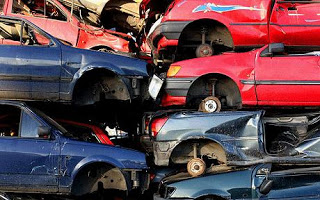 Scrapping your car, which essentially means recycling every viable part so it can be reused for some other purpose is a major component of the recycling industry. And it’s no secret that recycling is good for the environment. Cars contain metal and plastic in huge quantities, and if not scrapped, these materials can pose a danger to the environment. Recycling old automobiles is not just planet-friendly; it’s also pocket-friendly! Here’s a closer look at the car recycling process in general and the economic and environmental benefits it has for us.
Scrapping your car, which essentially means recycling every viable part so it can be reused for some other purpose is a major component of the recycling industry. And it’s no secret that recycling is good for the environment. Cars contain metal and plastic in huge quantities, and if not scrapped, these materials can pose a danger to the environment. Recycling old automobiles is not just planet-friendly; it’s also pocket-friendly! Here’s a closer look at the car recycling process in general and the economic and environmental benefits it has for us.
The Process of Scrapping a Car
The car scrapping process can be very complex because cars contain a number of components made of metal, plastic, glass, rubber, and upholstery, which need to be taken apart.
- A decrepit car may still contain some parts that are in a good condition which can be resold, such as the engine. Some junkyards even allow customers to walk in to their facilities and buy any used auto parts they might want.
- A car also contains many fluids, such as the antifreeze, Freon, brake oil, and gasoline which needs to be drained off before the car is scrapped. These fluids, if not drained in the right manner, can contaminate the environment because some of them are toxic in nature.
- The next step involves removing the battery. Car batteries, containing lead and battery acid are the most recycled product in the United States!
- Next, the tires are taken off. Car tires are composed of rubber, and hence can be recycled for use in the manufacture of other products.
- Now the frame of the car is crushed using a car crusher and compacted into small blocks which are easier to transport. These chunks of metal are then taken to a recycling facility where they’re shredded and separated into different metals such as ferrous and nonferrous metals. This metal is again shipped to a facility where it’s melted and mostly reused in the manufacture of new chassis and engine.
Advantages of Recycling Car Scrap
Environmental Benefits
- Vehicles are primarily made of iron and steel. Thus recycling cars also means we’re reusing the steel present in them. Each year, the steel industry recycles more than 14 million tons of steel by scrapping vehicles, which is the amount of steel used in 13.5 million automobiles!
- Steel production requires massive amount of coal. But recycling steel saves coal and reduces the formation of greenhouse gases which are produced when coal is burned.
- Recycling metals means conserving the planet’s natural resources. Metal is found in limited supply in the earth’s belly. By reusing what we already have, we save unnecessary mining and drilling into the earth’s surface which can lead to soil erosion and deforestation.
- Recycling the fluids present in vehicles prevents land and water pollution. These fluids contain harmful chemicals that can seep into water bodies and cause harm to human and animal life.
Economic Advantages
- Car scrap recycling can make you a neat little profit especially since scrap metal is a valuable commodity and scrap metal prices are always on the rise. You could also resell old parts to whoever needs them before you haul your car to the junkyard, which can also bring in a good amount of money.
- Old auto parts, after recycling, can be used in the manufacture of new auto products as raw material, which turns out to be cost-effective for car manufacturers. For example, Toyota and Mazda recycle old bumpers to be reprocessed and reused as new ones. New tires can also be manufactures using the recycled rubber from discarded tires. Daimler Chrysler also uses recycled tires to make radiator side air baffles. Metal that is collected after a car is crushed and sorted is used in the manufacture of new vehicles, flashlights, and even cameras! Recycled rubber from tires is commonly used in making flooring for playgrounds.
How to go about Scrapping your Car
If your car has neared its end of life and has little resale value, your best option is to resell it. Contact the junkyards in your area and learn the procedure you need to follow if you wish to recycle your vehicle. Visit the junkyard and find out as many details as you can such as the time taken to scrap the car, how the parts inside are recycled, and how much will you get paid. For instance, SIMS, which has recycling plants all over the country, accepts car scrap in certain locations such as Ferndale, NY or Camden, NJ.
In this day and age when “recycle” is the new mantra, it makes perfect environmental and monetary sense to scrap your vehicle, especially if it’s well past its prime and of little value to you. Auto recycling is a very lucrative business, yielding $22 billion in revenue in North America alone. The US Department of Transportation states that the number of motor vehicles scrapped in 2011 was 11,998,000. Big figures, aren’t they? So do your bit and act responsibly to protect the environment and also make some money in return by recycling your car when you no longer have use for it.

